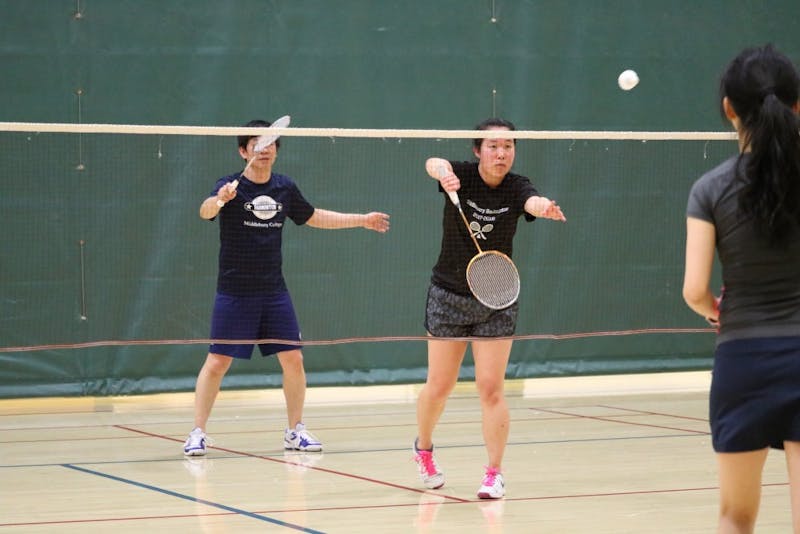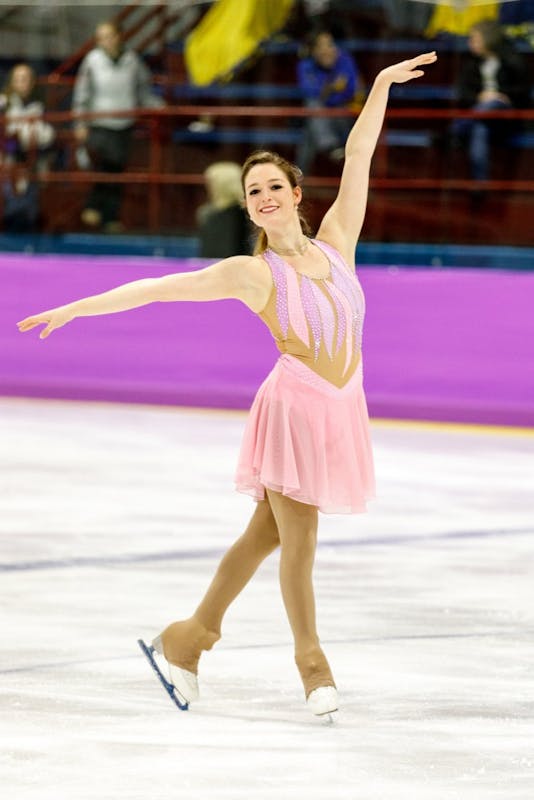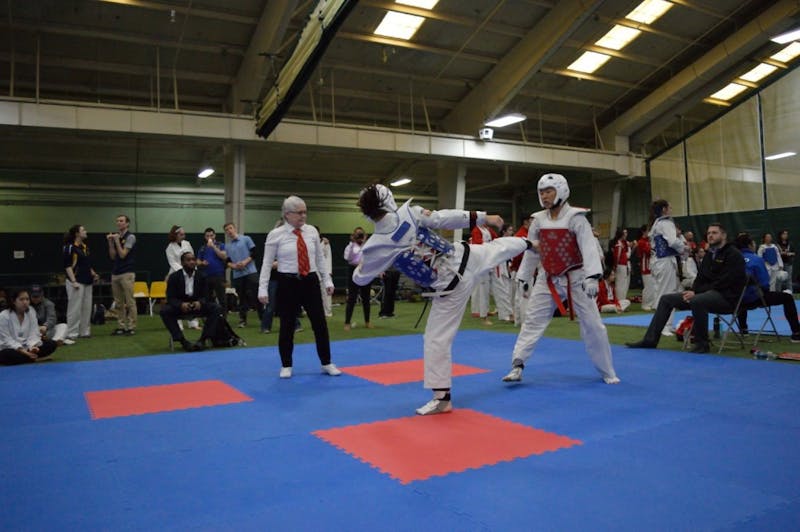Badminton

The Dartmouth Badminton Club strives to be one of the most inclusive club sports on campus, with no experience necessary and no tryouts required. This year, the club is seeing a boost in participation, particularly among first-year students, according to club president Christine Dong ’19.
“We have a mix of a lot of grad students, who are pretty competitive, and some ’22s who competed nationally in high school, so they are really good,” Dong said. “We also have people who are just trying it out for the first time or are just there for P.E. credit.”
One of those highly experienced first-year students in the club is Joanna Liu ’22.
“I started playing badminton when I was 7,” she said. “I played for nine years, and then I stopped for two years because of academic pressure and other extracurricular activities that I was committed to.”
Liu is enjoying the first few weeks of practices with the club.
“For me, [joining the club] is especially exciting because I wasn’t able to play during my last two years of high school, so especially this year for me is about picking up and trying to get back to where I left off,” she said. “It’s also a good place for me to socialize and to maintain a good exercising schedule.”
Dong believes the surge in first-year participation is the result of having a booth at the student activities fair during orientation week for first-year students, where many clubs set up booths in Leverone Field House and looked to recruit new members.
“Last year, there wasn’t a booth, so this year I think we advertised it more,” Dong said.
Liu had looked online before coming to campus and was excited to see that Dartmouth had a badminton club.
“I wasn’t sure how active the club was,” she said, but decided to sign up to join the Dartmouth Badminton Club while at the activities fair.
Liu is now an active member of the club.
“I try to go three times a week, but I don’t necessarily go for the whole two and a half hours, depending on my schedule,” Liu said.
Dong appreciates the presence of first-year students at practices.
“It’s nice to be able to develop a community with the ’22s,” Dong said. “You can get to know people waiting for a court to open, and then you can play with them, so it’s kind of nice to be able to talk and play at each practice, and not just feel like it is only competitive play.” Dong added, “The ’22s are really strong, so they’ve been able to step up and help coach some of the newer players.”
Both Dong and Liu agree that the club can be a great place to meet new people and form long-lasting friendships.
“The people in the club are really great, and they are definitely more committed to the sport than I expected when I first joined,” Liu said.
“I’ve met a lot of really nice people,” Dong added. “Some of my closest friends are in the club. It’s really nice to have this community of people who I can play with and get close enough with to do things socially outside of badminton as well.”
The team practices on Tuesdays, Thursdays and Saturdays in the West Gym of Alumni Gym. Although the club does not play matches against other schools throughout the year, practices typically consist of doubles matches.
Figure Skating

Dartmouth Club Figure Skating has accumulated an impressive amount of trophies over the past two decades since its 1997 inception, qualifying for the National Collegiate Figure Skating Team Championships every year since 2000 while winning six titles. Their championships include a five-year run from 2004 through 2008 under the tutelage of the late Michael McGean ’49 (whom they continue to honor) and his daughter Loren McGean ’92.
The team is currently coached full-time by U.S. Figure Skating quadruple gold medalist Jacki Smith and captained by Anna Staropoli ’19 and Isabelle Blank ’19. The team travels to three qualifying competitions and the National Championships every year. This season, the Big Green will perform at New York University on November 3-4, followed by competitions at the Massachusetts Institute of Technology and Pennsylvania State University in the winter, aiming to get fourth place or better at each competition to qualify for Nationals at the University of Delaware.
“In the past, we’ve done better at Nationals than we have in recent years,” Staropoli said. “We usually have placed in the top three at Nationals, but it’s been tough to [win] because of the D-Plan, and it’s hard to recruit because it is a club sport. We’re hoping to get back to that position.”
Dartmouth Figure Skating offers practices twice a day at Thompson Arena, typically in the early afternoon and at night, of which athletes must attend at least four. Coach Smith also offers individual lessons. The team consists of 25 members — two of whom are men — and got five new members at this year’s club fair.
“For the most part, a practice session is just you working on your elements and your programs,” Staropoli said. “It’s very self-motivated; you know what you have to do, and you’re supposed to run through everything. But it’s nice being here because a lot of time skating is so isolated, but at Dartmouth you know everyone on the ice. It’s very collaborative, but also you have enough ice time to work on things and control them on your own.”
In competitions, their players compete with other athletes at the same test level, with a varying amount of time allotted for their programs. Figure skating has an individual component, consisting mostly of freestyle programs and ice dance, as well as team maneuvers in which the team performs matching elements in matching uniforms. This season, the traditional six-point scale is shaking up, including a point for participation, and it remains to be seen how players will react to the scoring.
“It’s pretty sporadic with the scoring sometimes, but they’re doing the best they can and making changes that will hopefully be better,” Staropoli said.
Off the ice, the team focuses on keeping a close-knit social environment. For Staropoli, every dinner with the team is a meal with her best friends.
“We have weekly skater dates where we’re assigned someone to get a meal with,” Staropoli said. “We always joke that we’re constantly surrounded by each other. You go into the [Courtyard Café], and you run into nine skaters — it’s a great community.”
The team’s first test comes Homecoming weekend on Oct. 28 in a 2:45 p.m. exhibition at home.
Tae Kwon Do

Dartmouth Tae Kwon Do was founded in 1984 by Master Sung Chul Whang, Jun Chul Whang and Javier Arizmendi, sprouting out of Dartmouth’s Shotokan Karate Club. The original members also founded the Ivy-Northeast Collegiate Tae Kwon Do League. The club had a spell of inactivity, even dropping out of the league before Dae Kim ’19 revived the dying seven-member, inexperienced team two years ago. Today, the team is flourishing with 30 active members, 15 of whom come to every practice, according to co-president Jacob Swenberg ’21. They compete in the Eastern Collegiate Taekwondo Conference, renamed from the INCTL.
Swenberg and co-captain Gabriel Kuenzli ’21 organize club practices three days a week in Alumni Gymnasium. Practice typically consists of generic conditioning and warmup followed by specific taekwondo exercises in two main styles of the sport.
“We’ll work on forms [or] ‘poomsae’: a choreographed set of moves that are supposed to be done in a very structured way,” Swenberg said. “With that goes learning about different stances, learning a little bit of Korean so we can understand different commands. We do sparring too, so we get to put on pads and helmets.”
The team has its work cut out in practice this fall, as they are training a large number of athletes who have never sparred nor done poomsae.
“There are a few obviously who have a lot of experience with taekwondo, but there also a few who have experience with other martial arts and want to explore,” Swenberg said. “In large, a lot of the people who join have never done anything like taekwondo, so it’s cool to see people join, try something new and usually enjoy it.”
For those on the team who are more familiar with other martial arts, taekwondo presents some similarities but also major differences.
“Definitionally, [the difference comes from] country of origin: taekwondo is from Korea,” Swenberg explained. “In terms of what it looks like and what people do, it’s a lot more focus on legs and kicking as opposed to karate, which includes a lot of stuff with hands and full body movements. It’s less focused on fighting and more about self-defense in terms of practical use and discipline.”
This year, the club is hoping to manage a growing interest in taekwondo, keep everyone engaged and place in competitions. The offer to do taekwondo seems compelling when put in Swenberg’s words.
“I think it’s a really good opportunity,” he said. “The obvious one is physical activity because it’s a fun thing to do, and it’s supposedly one of the most intensive activities athletically. The team is really cool; it’s an interesting mix of people from all around campus. I’ve gotten to know many of them really closely, which is really cool to see.”
The team has not fully set their schedule yet, but typically competes in one tournament per term. On October 20th, Dartmouth Tae Kwon Do will head to the Massachusetts Institute of Technology for an ECTC competition.



